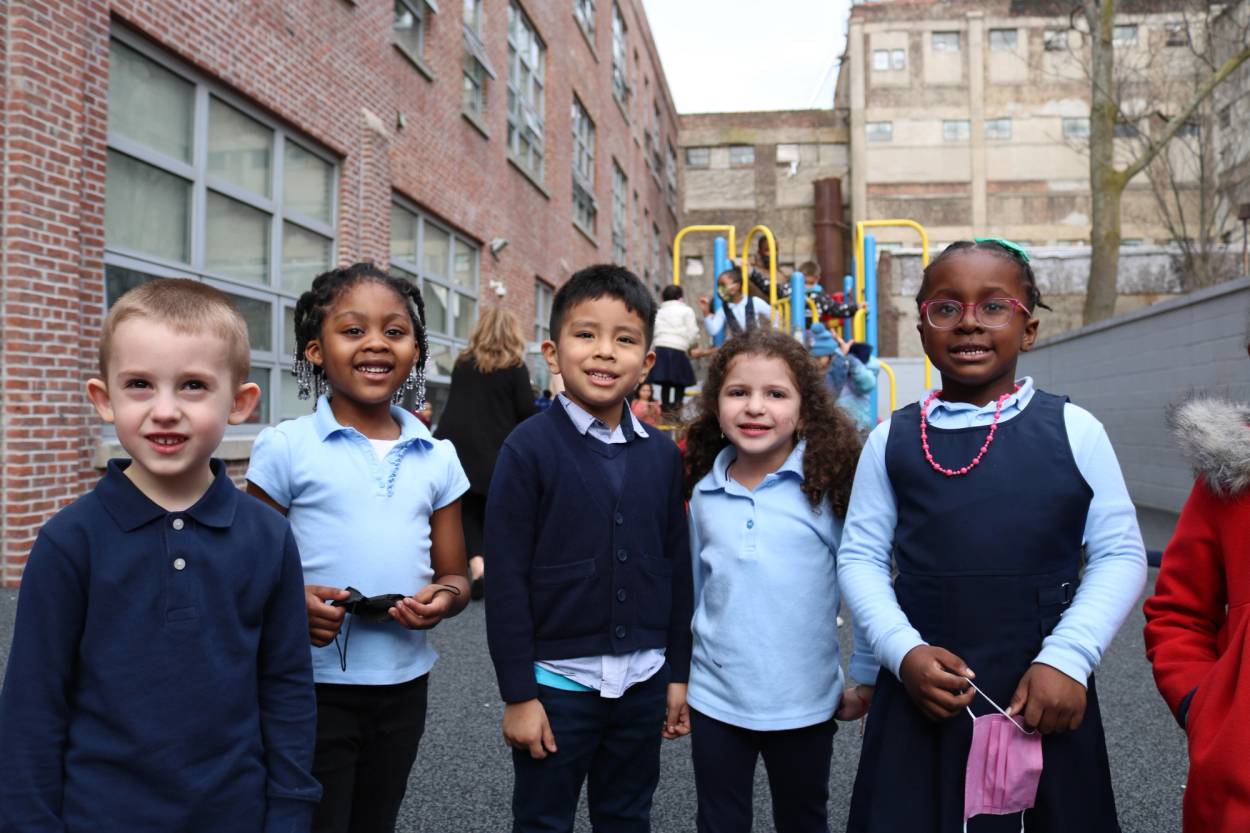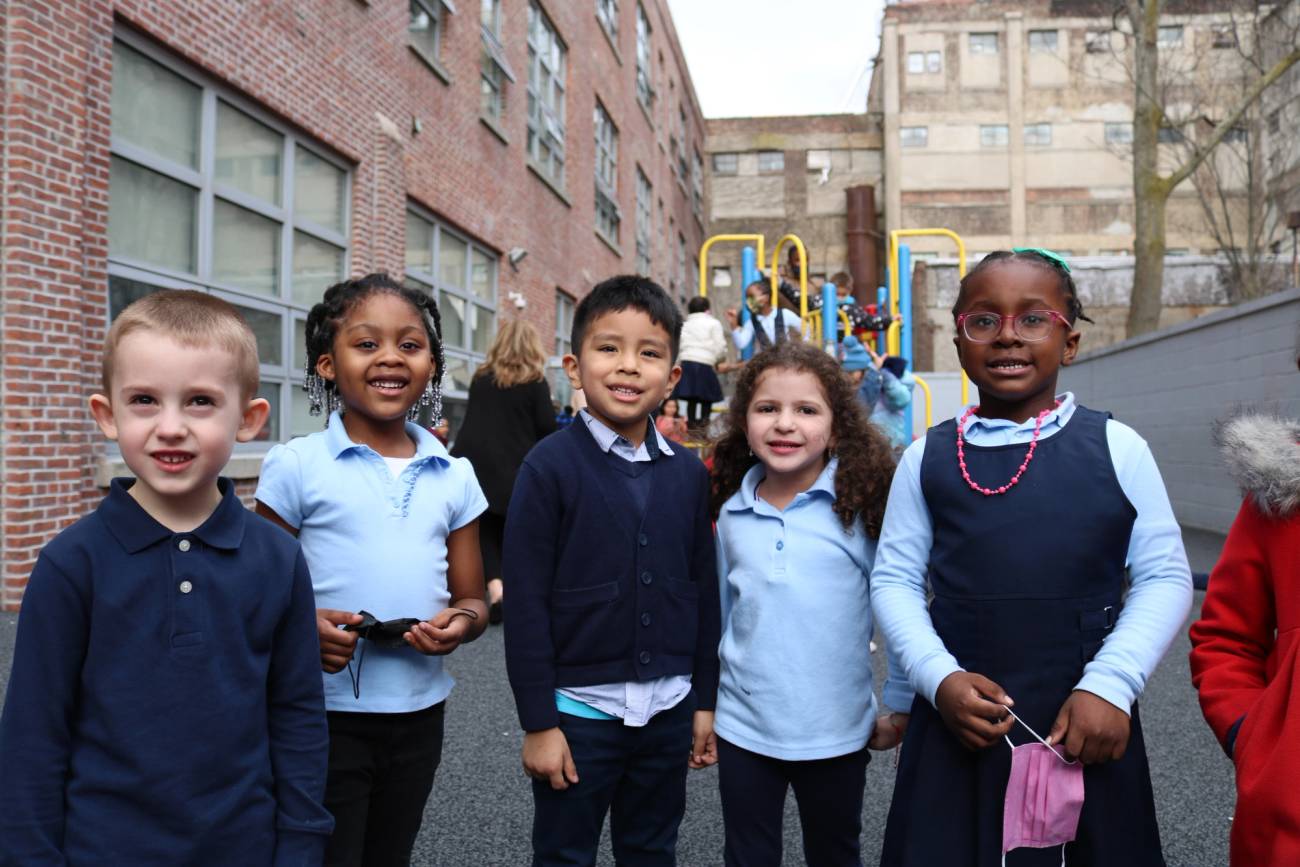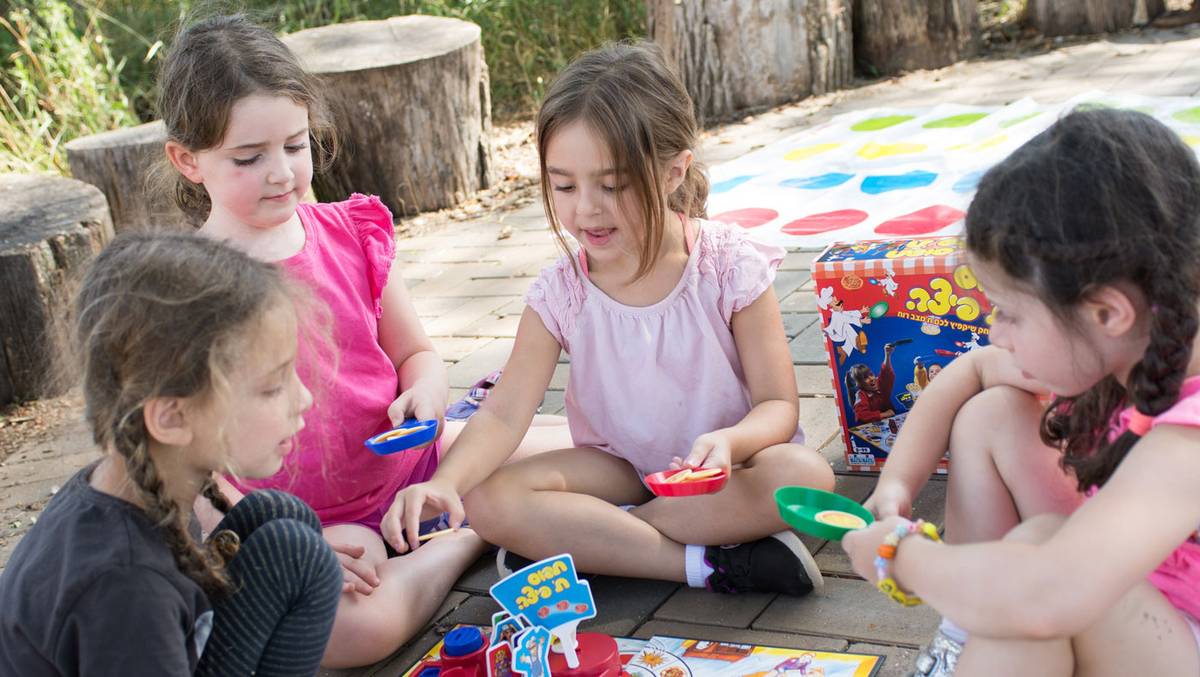The Changing Landscape of Hebrew Education
From day schools to summer camps, charter schools to online classes, a diverse range of students are studying the language




December 16 marks the 100th yahrzeit of Eliezer Ben-Yehuda, the scholar and journalist who revived Hebrew as a modern language. Born Eliezer Perlman in Lithuania, he arrived in Jerusalem in 1881 and dedicated himself to creating a 17-volume Hebrew dictionary—coining new words by scouring foreign dictionaries. He even raised his own son, Itamar Ben-Avi, as the first native Hebrew-speaking child in modern times. During his lifetime, his efforts to revive Hebrew were met with fierce opposition. Today, millions of Hebrew speakers in Israel and worldwide (including his great-grandson, Israeli celebrity chef Gil Hovav) keep his legacy alive.
In America, Hebrew took root in the 20th century with the growth of the Zionist movement and the creation of the Histadrut Ivrit in 1916: Hebrew teacher training colleges emerged, as well as Hebrew-speaking camps, and synagogue schools taught Modern Hebrew. Following the establishment of the State of Israel in 1948 and the rise of ethnic studies in the 1970s, Hebrew language classes began to proliferate in American universities and public high schools.
In the 21st century, though, the landscape has changed. Students who attend Jewish day schools, like those in the Prizmah day school network, learn Modern Hebrew as a key subject, but the larger numbers who attend supplemental Jewish schools often do not. Synagogue schools in the U.S. now generally meet just once or twice a week, emphasizing reading Hebrew for ritual participation rather than conversation. With notable exceptions—such as the Ivry Prozdor Teen Learning Program at JTS—Hebrew is just an elective at supplementary Jewish high schools.
Connection to Israel remains a key motivation for learning Hebrew, but Jews under the age of 30 feel less connected to Israel than older generations do, so their interest in learning Hebrew is also lower. College foreign language study has steadily decreased, with Modern Hebrew enrollment reduced by nearly 18% between 2013 and 2016 alone (with very preliminary estimates indicating an approximate 13% drop for fall 2021), according to the Modern Language Association. While 52% of American Jews know the Hebrew alphabet, only 13% say they understand most or all of the words when they read Hebrew, and only 1 in 10 can carry on a conversation in Hebrew, according to Pew Research findings.
However, these statistics miss the broader picture. Modern Hebrew is very much alive—and not just in day schools, or even only among Jews. A highly diverse religious, ethnic, and racial mix of all ages is still learning Hebrew in charter schools (such as the Hebrew Public Network and Ben Gamla), traditional public schools, universities, and Jewish summer camps. The internet has also opened up Hebrew to a wider audience: Students from 14 states study Hebrew online at Gratz Academy, the Gratz College Hebrew high school program, while online adult learning programs at such institutions as Gratz College, American Jewish University, Hebrew College, and JCCs across the U.S. offer Modern Hebrew classes. And since April 2020, 2,866 Hebrew learners (35% adults, 65% teens) have participated in small group classes with certified Israeli, native Hebrew-speaking teachers through Ofek Hub, the Israel American Council’s online learning platform.
A century after Eliezer Ben-Yehuda’s death, his legacy endures, far beyond the Jewish state—and even beyond the Jewish community. Global audiences now watch Hebrew films, listen to Hebrew songs, and know how to speak the language.
Elana Simon is Jewish with a mixed racial and ethnic background (Dominican with a Black father), while her husband is Israeli. The family is observant and attends a Sephardic synagogue in Brooklyn. Nine years ago, when Simon began researching schools for her eldest daughter, neither a Jewish day school nor a standard public school met the family’s needs.
“We wanted an environment that is really inclusive,” explained Simon, adding: “For us it was important that they learn Hebrew, but not just to pray.”
Since kindergarten, both her daughters—Talia, an eighth grader, and Aviva, a third grader—have attended the Hebrew Language Academy Charter School (“HLA”) in the multicultural Mill Basin neighborhood of Brooklyn. Every student in the school, which runs from kindergarten through eighth grade, learns Modern Hebrew and Israeli culture for one hour a day with native speakers who engage students with Hebrew songs, Israeli cartoons, and other tools. “My girls tell me that the teachers who teach Hebrew do so in a fun and interactive way,” said Simon.
HLA, which opened in Brooklyn in 2009, is the founding school in the Hebrew Public network, which now includes 4,000 children at 11 campuses across America: those directly managed by Hebrew Public in New York City and Philadelphia plus a national network of affiliate schools that receive support in such areas as Hebrew language instruction.
“It is not a replacement for Jewish day school education,” emphasized Valerie Khaytina, chief external officer of Hebrew Public. Unlike Jewish day schools, public charter schools don’t teach religious subjects such as Torah and Jewish prayer. Also, not all students at the charter schools are Jewish—although as public schools, they cannot ask students their religion.
“Many of the families want Hebrew because it is the language of the Bible,” said Khaytina. But other families want their children for less religious reasons—to learn a second language because of the cognitive and social benefits of bilingual education.
“We liked that the school connected to Israel and that the boys would learn English as well as Hebrew as a second language,” said Yaroslav Rovinsky, whose family is not Jewish and has never visited Israel. His two sons, now in first and third grade, entered HLA when the family emigrated from Kyiv in May 2022. “The kids enjoy the Hebrew songs and Hebrew is one of their favorite lessons.”
Hebrew language can serve as an antidote to antisemitism in America, while fostering a love of Israel. “At a time when antisemitism is on a rise, our schools are a natural option to instill an appreciation for Israel,” said Khaytina. “Kids of all backgrounds learn about Israel from kindergarten and grow up immersed in Israel and Israeli culture. They grow up hopefully becoming friends of Israel for life because of the big connection they build to Israel.”
At the Sela Public Charter School in Washington, D.C. (an affiliate school in the Hebrew Public network), demographics mirror those of the city: The majority of the 280-student body is African American (65%) with an estimated 10%-12% Jewish. Sela has a two-part mission, says Head of School Joshua Bork: First, Hebrew immersion, because all students enter as new Hebrew language learners; second is diversity by design. “We learn best when we learn with others who are not like us,” he explained. “The way we do instruction in Hebrew in the school is a way to bridge the differences in D.C. by learning something new.”
Sela’s Hebrew-language teachers—trained and certified by the Israeli Ministry of Education—are selected by the Arbel Fellowship program to teach Hebrew in America. In K-3, Sela uses a 50/50 model of language immersion: Half of classroom activities take place in Hebrew and half in English; classrooms are staffed with two teachers, one Hebrew and one English speaker. In grades four and five, students attend a one-hour literacy block in Hebrew each day taught by Hebrew teachers using a combination of whole-class instruction and targeted, small group instruction, with Israeli cultural studies worked into the English school day.

Sela families often forge a deep connection to Israel. “Once they see students learning Hebrew, families want to learn more about Hebrew and Israel, and some families have made trips to Israel,” said Bork.
“We see Hebrew charter schools as a powerful way to bring the Hebrew language and love and knowledge of Israel into the public sphere in America,” explained Rabbi David Gedzelman, president and CEO of The Steinhardt Foundation for Jewish Life. “Bringing Hebrew into the Hebrew language charter schools, public middle schools, and public high schools is essential for making Hebrew relevant for those of all backgrounds including American Jews … When Hebrew is legitimate in a public educational context, then it is legitimate for Jews and everyone else.”
Hebrew is also experiencing steady enrollment at traditional public schools, reports the 2019 study—Mapping Hebrew Education in Public Schools: A Resource for Hebrew Educators, by professors Sharon Avni and Avital Karpman.
Glenbrook North High School in Northbrook, Illinois, is one of several Chicagoland public high schools offering Hebrew for credit. Its program began in 2010 with 50 students, and now includes more than 100 students in five levels of Hebrew. Like the school’s other world languages, the curriculum adheres to ACTFL (American Council on the Teaching of Foreign Languages) proficiency guidelines for speaking, writing, listening, and reading, as well as Illinois World Language Guidelines. “We teach language with a focus on culture,” said Josh Morrel, the high school’s world languages instructional supervisor.
For Glenbrook North junior Ellie Erlich, Hebrew classes came in handy during her summer program in Israel last year. “When I went into shops, I was able to communicate, ask how much something cost, or just say thank you,” said Erlich, who looks forward to practicing Hebrew this summer at her Jewish camp.
Despite anti-Israel sentiment on many campuses, American college students continue to take Hebrew, although course offerings range considerably from one or two introductory classes at some schools to an extensive suite of Hebrew courses at all levels at schools like the University of Maryland at College Park.
“We are attracting students from all across campus, from different religious and ethnic backgrounds, who are interested in studying Modern Hebrew and relevant cultural issues coming out of Israel,” said Avital Karpman, director of the University of Maryland’s Hebrew language program, where enrollment has held steady since 2007 with approximately 75-100 students per semester.
These students range from complete beginners to Jewish day school graduates, Jewish studies majors and Hebrew-speaking Israeli-Americans, Jews and non-Jews alike. Jonathan Parris, a Hebrew student and religious Christian who dreams of visiting Israel, perceives Hebrew as a way to better understand the history of Christianity. At the same time, Danya Levy, a senior linguistics major who plans to study for an M.A. in Jewish studies with the goal of a Ph.D. in Semitic languages, said, “I think it is important to study Hebrew because it is a direct connection to Jewish history.”
Indeed, college Hebrew students do not fit any single profile. Sariel Birnbaum, who teaches Hebrew at UCLA, says that his students run the gamut from complete beginners to someone like Alex Rubel, who attended Jewish day school through high school and spent his gap year studying in Israel.
This past fall, Esther Raizen, a Hebrew professor at the University of Texas at Austin—which offers a longstanding, robust Hebrew language program—surveyed her students why they are studying Hebrew. Improving Hebrew skills and communicating in Hebrew in Israel topped the list, with Hebrew also considered an important career skill: Sophomore Orly Cohen wants to maintain and improve Hebrew skills she learned in Jewish day school while Alyssa Gilman, a ROTC student, hopes to work in military intelligence, potentially with Israel on issues of joint concern such as defense and disaster relief. And Elijah Kahlenberg, who is minoring in Hebrew, aspires to an academic research career in Middle East/Eastern Mediterranean studies focusing on Arab-Jewish relations, histories of minorities in the Ottoman Empire, and peace movements/ideologies in the context of Israel/Palestine.
Hebrew is also alive in informal settings such as Kayitz Kef (Summer of Fun), where campers learn to communicate in Hebrew and connect to Israel by interacting with Israeli counselors trained in the language proficiency approach. Launched in 2013 at Ramah Day Camp in Nyack, New York, in 2022 the program attracted 1,500 campers at 20 Jewish camps (16 day and four overnight) with plans for expansion in summer 2023. “As someone who acquired Hebrew language by hanging out with friends, I see the relationship between the child and the counselor as a natural way to communicate in the language,” said Sharon Schoenfeld, national director of Kayitz Kef.
Hebrew has become an integral component of Jewish summer camps across denominations and ideologies. The emphasis today is on Hebrew infusion rather than formal Hebrew classes. That means infusing Hebrew in daily camp life, with signs such as “chadar ochel” (dining room), singing Hebrew songs, and using terminology such as “ruach” (spirit), and “omanut” (arts and crafts).
Nevertheless, there are daily challenges, said Rabbi Andrew Ergas, CEO of Hebrew at the Center, which trains teachers in Hebrew language instruction: There is a broad antipathy toward language learning in general, the availability of Hebrew texts in English lowers the incentive to learn Hebrew, and Jewish community leaders need to better understand the value of Hebrew skills.
It’s critical to professionalize Hebrew teaching and train instructors on the proper methodology to help learners gain Hebrew proficiency, emphasizes Vardit Ringvald, director of the Consortium for the Teaching of Hebrew Language and Culture at Brandeis University, a research professor at the Mandel Center for Studies in Jewish Education, and founding director of the School of Hebrew at Middlebury College, which offers an M.A. program in teaching Hebrew. “The revolution will come only if we have standards for the profession like any other program in the U.S.”
Despite these challenges, 100 years after Ben-Yehuda’s death, Hebrew language learning remains on solid ground. “We have created new pathways into engagement with Hebrew and hope we can build on that momentum to have some real impact,” explained Hebrew at the Center’s Ergas. During his lifetime, Ben-Yehuda was called a fanatic because of his insistence on speaking Hebrew and determination to make Hebrew a living language. But because of his vision, Hebrew has become a vibrant language heard from classrooms to the streets.
Paula Jacobs is a writer in the Boston area.